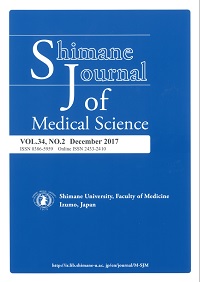Shimane University Faculty of Medicine
ISSN :0386-5959(冊子体)
ISSN :2433-2410(オンライン)


これらの論文は クリエイティブ・コモンズ 表示 - 非営利 - 改変禁止 4.0 国際 ライセンスの下に提供されています。
ダウンロード数 : ? 件
この文献の参照には次のURLをご利用ください : https://ir.lib.shimane-u.ac.jp/5867
Shimane Journal of Medical Science 20 1
2002-06-01 発行
Influence of environmental factors on the development of stroke in stroke-prone spontaneously hypertensive rats (SHRSP) : effects of residential condition and population density
ファイル
内容記述(抄録等)
Stroke-prone spontaneously hypertensive rats (SHRSP) were bred in either wire-mesh cages (WMC) or plastic cages with wood-chips bedding (PWB), individually or in a group of 3 rats. The present study examined the effects of different residence conditions and population density on the development of hypertension, incidence of stroke, and on survival rate in the SHRSP given 1% NaCl water for drinking. As a result, the stroke or hypertensive encephalopathy was observed in all of rats. Life spans of the individual-housed and group-housed in WMC were 39 and 51 days, respectively, and those of the individual-housed and group-housed in PWB were 82 and 108 days, respectively. The PWB residence condition clearly delayed the development of severe hypertension and the incidence of stroke. No difference was found in body weight gain or blood pressure among the rats housed in either condition. These results demonstrated that the dential condition and population density affected the time to incidence of stroke and survival rate in SHRSP. Thus, it is suggested that the environmental condition related to emotional or psychosocial stress may cause biased experimental results.
About This Article
Other Article
